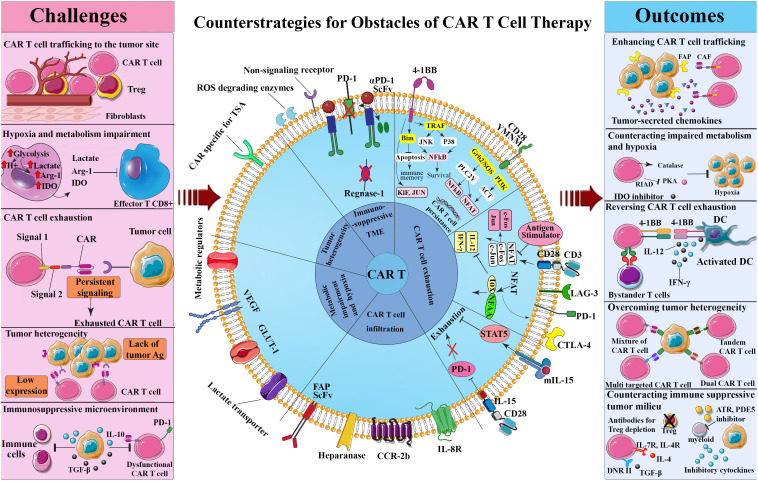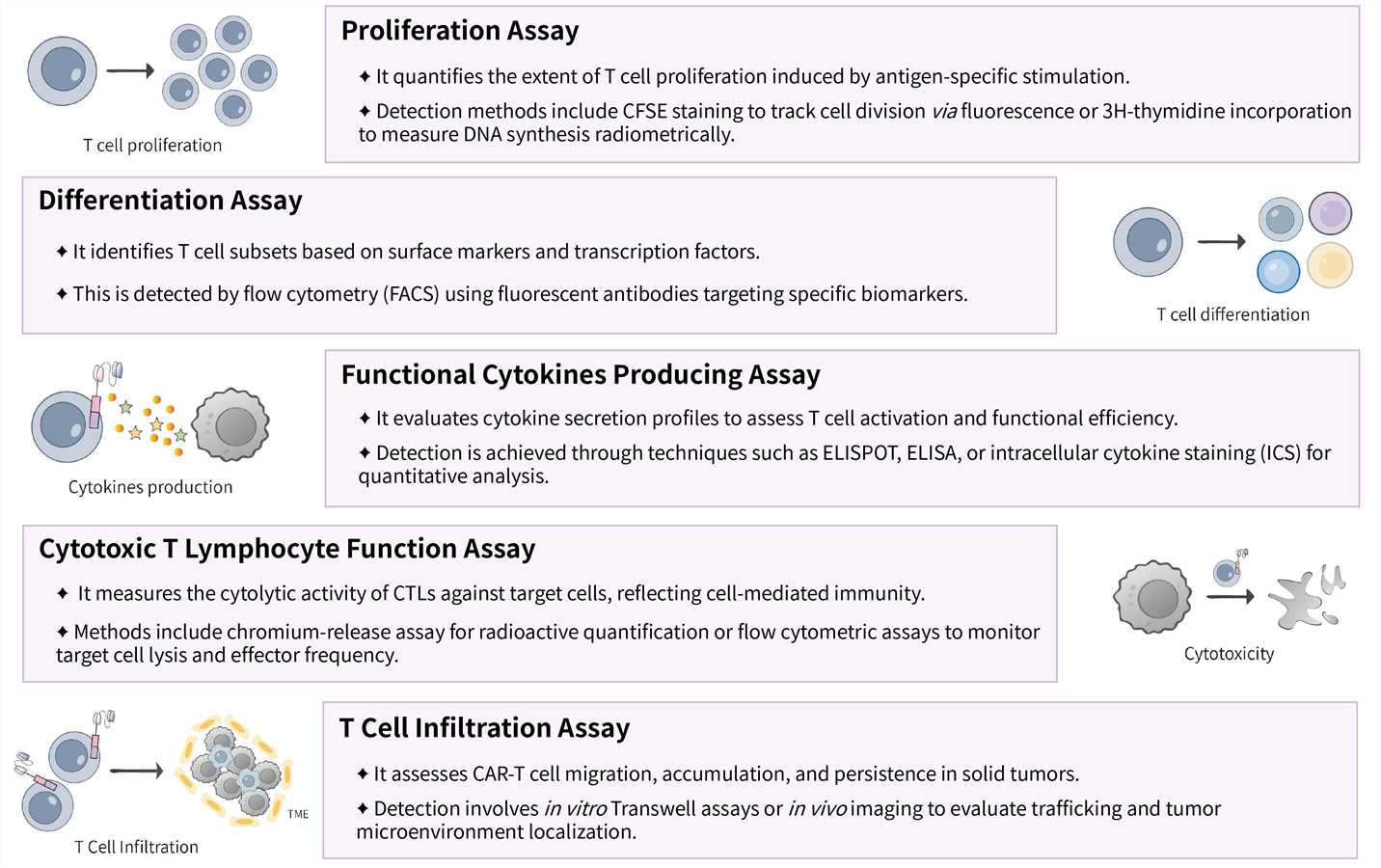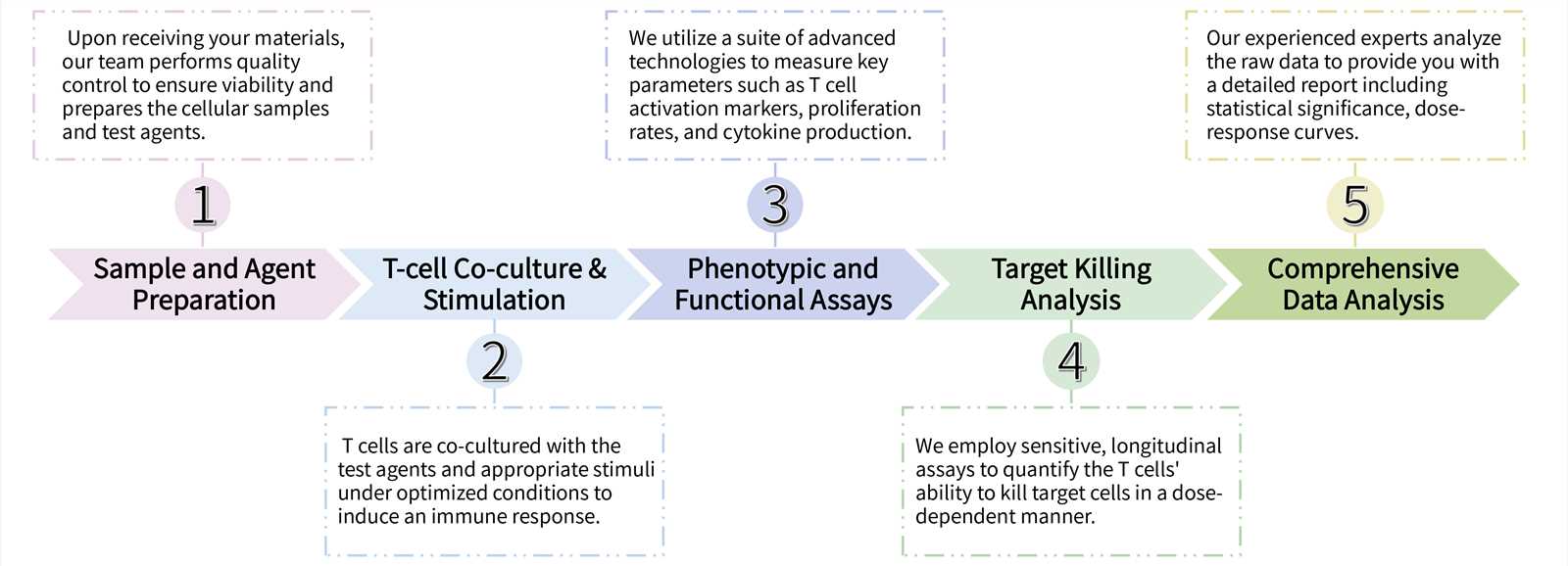CAR-T cell therapy is highly dependent on the proliferation, differentiation, cytokine secretion, and cytotoxic functions of T cells. However, due to insufficient sensitivity and limited data dimensions, traditional detection methods often fail to fully capture the enhancing or inhibitory effects of candidate drugs on T cell function. Creative Biolabs' Enhancement or Inhibition T Cell Response Detection Service systematically and parametrically analyzes key indicators such as T cell activation, proliferation, killing activity, and cytokine release based on advanced and diverse detection and analysis technologies and a multi-dimensional functional evaluation system. Our service not only accurately quantifies the functional properties of CAR-T cells, but also provides clear functional evidence for the mechanism of action of immunomodulatory drugs.
CAR-T cell therapy has delivered paradigm-shifting efficacy in hematologic malignancies and is widely viewed as a potential disruptor of solid-tumor treatment. Yet its extension to solid indications is constrained by a four-pronged barrier: inefficient tumor homing, metabolic and signaling blockade imposed by an immunosuppressive tumor microenvironment (TME), antigen-heterogeneity-driven escape, and terminal T cell exhaustion. Within this landscape, the magnitude of proliferation, depth of activation, cytokine signature, and cytotoxic potency collectively constitute the gold-standard metrics for gauging in vivo CAR-T performance and immune-reconstitution capacity.
 Fig.1 CAR-T cell therapy: current challenges and innovative solutions.1
Fig.1 CAR-T cell therapy: current challenges and innovative solutions.1
Creative Biolabs' Enhancement or Inhibition T Cell Response Detection Service delivers comprehensive, data-driven analysis to accurately characterize the impact of your therapeutic candidates on T cell function. We utilize various assays, surpassing conventional bulk methods, to generate the granular, multi-parametric data required in contemporary drug development. Through systematic evaluation of critical functions, including proliferation, activation, cytotoxicity, and cytokine secretion, we provide definitive insights into immunomodulation, supporting confident research and development decisions.
To rigorously assess the functional potency of CAR-T cells, Creative Biolabs employs a comprehensive suite of analytical assays designed to quantify T cell response dynamics, including both enhanced activation and inhibitory phenotypes.

Required Starting Materials:
Key Steps Involved:

Final Deliverables:
What specific T cell functional analyses are available?
Our portfolio encompasses a broad spectrum of T cell functional analyses. Key parameters include proliferation kinetics, activation marker expression, multiparametric cytokine profiling (to quantify both enhancement and suppression), and precise measurement of cytotoxic activity. Our assays are designed with modularity to be tailored to your unique experimental objectives.
Are your services compatible with diverse sample types, such as those from human and murine sources?
Absolutely. Our protocols are rigorously optimized for a wide array of sample matrices. This includes human PBMCs, highly purified T cell subsets, and primary cells from established animal models (for example, mouse). We prioritize adapting our methodologies to ensure robust performance with your specific sample input and research needs.
Go beyond mere development with Creative Biolabs' integrated CAR-T therapy platform. We empower your research from concept to clinic with definitive validation. Our specialized analyses go deeper, quantifying the precise functional attributes of CAR-T cells, from potent activation to immune evasion profiles, to unequivocally demonstrate their therapeutic potential.
"Using Creative Biolabs' T-cell response detection service in our research has significantly improved our ability to measure the true efficacy of our lead compounds. The detailed analysis captured heterogeneity we missed with our in-house bulk assays, which was critical for understanding their mechanism of action. " J. M*****l.
"The quick turnaround and detailed reports from Creative Biolabs were a game-changer for our preclinical studies. The data on T cell proliferation kinetics allowed us to make faster, more informed decisions on our vaccine candidates, saving us valuable time and resources. " T. B****n.
"We initially had concerns about the reproducibility of T cell assays, but the standardized protocols and expert interpretation from Creative Biolabs were exceptional. We now have a reliable, scalable platform for all our immunomodulatory testing, providing a robust foundation for our drug safety assessments." P. C*****a.
To propel your immunotherapy research forward, leverage Creative Biolabs' specialized capabilities in T cell analysis and cutting-edge technology. Our partnership is dedicated to generating the decisive insights you need to navigate the development pathway with certainty.
Connect with our specialists to initiate a conversation about your research goals.
Reference
For any technical issues or product/service related questions, please leave your information below. Our team will contact you soon.
All products and services are For Research Use Only and CANNOT be used in the treatment or diagnosis of disease.
 NEWSLETTER
NEWSLETTER
The latest newsletter to introduce the latest breaking information, our site updates, field and other scientific news, important events, and insights from industry leaders
LEARN MORE NEWSLETTER NEW SOLUTION
NEW SOLUTION
CellRapeutics™ In Vivo Cell Engineering: One-stop in vivo T/B/NK cell and macrophage engineering services covering vectors construction to function verification.
LEARN MORE SOLUTION NOVEL TECHNOLOGY
NOVEL TECHNOLOGY
Silence™ CAR-T Cell: A novel platform to enhance CAR-T cell immunotherapy by combining RNAi technology to suppress genes that may impede CAR functionality.
LEARN MORE NOVEL TECHNOLOGY NEW SOLUTION
NEW SOLUTION
Canine CAR-T Therapy Development: From early target discovery, CAR design and construction, cell culture, and transfection, to in vitro and in vivo function validation.
LEARN MORE SOLUTION